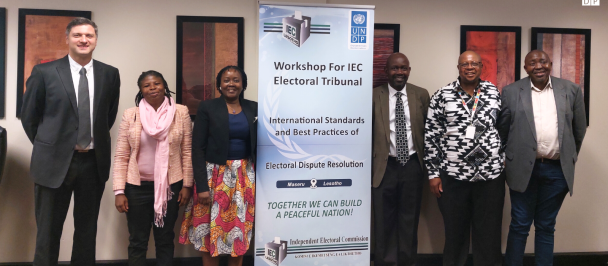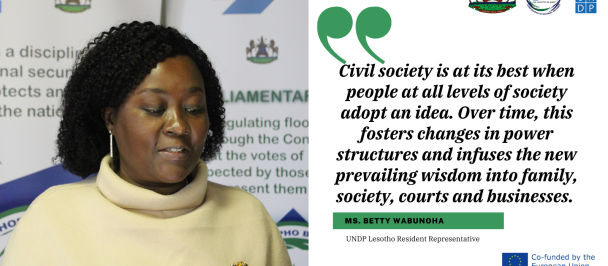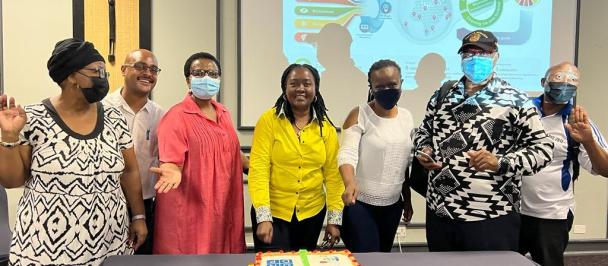"Political Parties Representatives and Facilitators
In advance of the e 2022 general elections, UNDP Lesotho is working with political parties on conflict management to enhance peace-making capacity, effect local conflict management capability and improve mediation skills. This is part of efforts to promote national and local infrastructures for peace, as well supporting the growth and profile in the number of women in the areas of conflict management and peacebuilding. These Conflict Management Initiatives look to respond to Outcome 4.5 of NSDPII “Human Rights, Political Rights, Civil Liberties & Political Participation”. The Conflict Management Initiatives also build on the SADC initiatives to mapping and building national regional infrastructures for peace in the Southern African regional to which UNDP has provided technical contributions.
Noting recent political volatility as evidenced by three national elections in five years (2012-2017) and four Coalition Governments in eight years, state and governance institutions have been weakend, and the economy in decline, UNDP is providing continued and tailored support which to build national capacities for conflict prevention, mediation and transformation for both government and non-governmental organisations, the development of intra-and-inter-party democracy and consensus building among political parties and the political and security elites, as well as support to the ongoing national reforms process.
The conflict management workshop was targeted at political parties inside government. It focused on teaching participants about the theory of conflict management and resolution, values, principles, institutions and practices; national peace architecture to sustain peace while departing from the narrow-focused conflict prevention strategies; and how to create democratic structures within political parties. “In our facilitation we usually guide conflicting parties to reach consensus and resolution, however through this workshop we have learned that as presiding officers during conflict resolution our task is simply to help conflicting parties come up with solutions themselves under our supervision.” Tšitso Cheba from a participating political party.
Peace begets a flourishing economy and denotes equality. In her closing remarks, emphasising the importance of peace om the economy, UNDP Lesotho Resident Representative Betty Wabunoha stated:
“This training, having covered understanding and analysing conflict, mediation and infrastructure for peace, gives us all the route to ensuring we are able to prevent conflict where possible, resolve conflict where it arises, ensure party democracy and consensus building so as to allow for Lesotho’s economic development to also take its course without delay and derailing."
The role of women and the youth within the structures of political parties as drivers of peace is important. Consequently, UNDP Lesotho has made a commitment to engage these marginalised groups in similar workshops later this year. “I can implement what I have learned here by championing gender equality within my political party and by encouraging fellow members to recognise that women are also able to uphold certain positions, while also not neglecting the LGBTQI community.” Rorisang Lepetse, a female participant from a participating political party proclaimed confidently. Aligning with UN Security Council Resolution 1325 and UN Security Council Resolution 2250 on the inclusion of women and the youth in conflict management and peacebuilding, UNDP Lesotho continues to uphold these principles and to take deliberate actions to achieving them.
From the Christian Council of Lesotho (CCL), which partners with UNDP Lesotho in conflict management and peace-making initiatives, Bishop Rantle reminded participants that what makes us, and what brings us together is the realisation of our co-dependence as human beings – Ubuntu “I am because we are”. Therefore, political parties can only exist because of Basotho who support and elect them into parliament, granting them a central role to maintaining peace and tranquillity in the Mountain Kingdom. Indeed, to achieve sustainable peace in Lesotho, UNDP will continue to exist in partnership with the Basotho people and relevant societal structures.

 Locations
Locations


